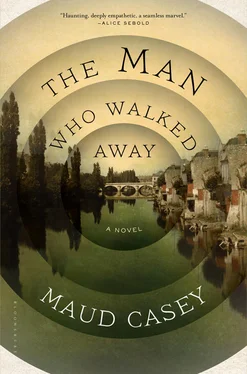The man speaks hundreds of kilometers in a breath: from Montpellier to Narbonne, from Pézenas to Geneva, from Cette to Berlin, from Castelnaudary to Charleroi. From Verviers to Vienna! The place names trip off his tongue, an incantation of bemusement and bafflement, as if he is speaking about the adventures of another man entirely. There is something oddly innocent about his befuddlement, as if he were astonished at his own debilitating condition.
The Doctor finds himself imagining this man as a part of the throngs of pilgrims during the Middle Ages who sought refuge in the asylum when it was on the pilgrimage route of Saint James. If the man had lived then, he might very well have been considered a spiritual pilgrim, but he didn’t, and so he is a patient.
“Where else have you traveled, Albert?”
“Maastricht. Düsseldorf, Cologne, Bonn. . Kassel, Frankfurt. . Hanau, Aschaffenburg, Darmstadt. . Würzburg, Nuremberg. Linz. . Amstetten! Salzburg, Schaffhausen, Basel, and Delle. Interlaken. . the canton of Vaud. Bonsecours? Yes, Bonsecours!”
He was here and then he was there. There is nothing in between.
“I found myself in Tours,” Albert says, “but first I was sleeping on a bench in the Orléans station in Paris.” But then he is somewhere else. “Once the Dutch police, because I had no money, sent me to the Belgian frontier.” Then, somewhere else entirely. “In Prague, a group of French students took up a collection for me. Eight florins and a shirt, they gave me.”
As far as the when and where, the if , of his eating or drinking or his sleeping, the Doctor notes, the man has not a clue. If he ate or drank, he doesn’t remember it; if he slept, he cannot recall. In this town, the consul would have nothing to do with him; in that one, he was given a travel warrant to return home on foot. He wakes up and wakes up and wakes up here and here and here, but the journey remains a mystery.
“Arles, or was it Nîmes? I left it abruptly.”
His life is an endless sentence with more ellipses than words, with intermittent and puzzling punctuation.
The smell of burned mushrooms drifts down the hall.
“All of them burned?” the Doctor hears Nurse Anne ask.
“Most,” Henri says.
“Would you like me to go on?” Albert asks. He sits in a chair across from the Doctor. Out the window above Albert’s head, the Doctor watches as the public officials spill onto the steps of the Palace of Justice. The bell of St. Eloi rings, followed by the asylum bell.
“It is time for dinner,” Albert says.
“It is time for dinner,” the Doctor says, “but from the smell of things, dinner will be a little late today. Would you mind if we spoke for a while longer? I’d like to make a map of your travels.”
“Of course,” Albert says. “Whatever you like. I want to do whatever you like.”
“But why?” Elizabeth cries. “I only want to fix the wing.”
“No more glue.” It is the Director. “Not after the mess from last time. .”
“Beauty. Lies,” Elizabeth says. “Lies. Beauty lies. There lies beauty.”
“It is useless,” Albert says.
“What?”
“That wing.”
“Well, perhaps,” the Doctor says, interested to discover Albert has been listening as keenly as he has to the noise from down the hall. “But Elizabeth is very fond of it.”
“Yes,” Albert says. “It is useless but beautiful.”
“Let’s make something useful,” the Doctor says. He pats Albert’s knee and his knee jumps. “I’ll be right back.”
When he returns with a thick black pencil and a map of Europe torn from a newspaper, the Doctor traces Albert’s peregrinations. The thick black line meanders through much of the German Empire and some of Austria-Hungary; it passes through Serbia, Bulgaria, and Eastern Rumelia.
“And Constantinople,” Albert says.
“Constantinople?” the Doctor asks.
“Yes.” Albert nods. “It’s a longer story, I’m sure, but I only remember leaving.”
And always home to Bordeaux.
The Doctor connects the dots and there is the map of Albert’s life.
“Does this look familiar?” the Doctor asks, holding up the map.
Albert tilts his head. “How curious,” he says, as if the Doctor is showing him a magic trick instead of the shape of his life.
“These are your journeys,” the Doctor says.
“How delightful,” Albert says.
It is not a happy story . Still, the Doctor thinks, there are so many different unhappy stories. Happy families are all alike; every unhappy family is unhappy in its own way , but this is not a novel. The stories — happy and unhappy; these are the invisible lesions. This is what the great doctor has missed. In the women hysterics, the great doctor believes the cause of hysteria is always moral but the origin is neurological. What the Doctor wants to describe goes beyond an invisible lesion. It has more to do with the story the patient tells as a means of achieving peace. The problem is not that Albert’s story of his life is happy or unhappy; it is that it is invisible to him.
“Stay away from me!” the veteran cries from the billiard room, and then there is the sound of billiard balls crashing to the floor and the murmur of Henri’s voice trying to soothe him and then Claude’s voice demanding that the veteran come with him to his room.
“Let’s start again from the beginning, Albert. How old are you?”
“Inquiries would have to be made.”
“Do you remember that we have already discussed the likelihood that you are twenty?”
“If you made such inquiries. . well, then. . you must know.”
“Do you know how long you have been traveling, Albert?”
“Years? Years and years? I was not a vagrant.”
“How many years?”
“I cannot say. I first walked when I was a child, but then again, I am not sure. . it is gone as soon as I think of it. The leaves of the trees in the public garden were gold, and so tempting, though I did not mean to leave, but that was another time altogether.”
“How old were you?”
“I’m sorry, time does not present itself to me. In Mont-de-Marsan, I think I enlisted there. . but then it is gone. The 127th Infantry Regiment at Valenciennes. But later I left. I could not stay. I can’t remember. It is gone again. There is sometimes a feeling before I walk. Headaches. . I have headaches. A ringing in my ears? I am sometimes very thirsty. I sometimes fall down. There are times. .” Albert’s face goes red to the tips of his ears.
“Yes?”
Albert points to his lap, and the Doctor notes a possible proclivity for self-abuse.
“I will tell you more tomorrow.”
“There is no rush,” the Doctor says, though all he wants is for Albert to tell him more right now.
“When I stop walking. .” Albert says, “everything begins to go dark. It’s as though I’m disappearing. It is too painful to contemplate. I’m afraid I will walk again. I don’t want to leave.”
“We will not let you walk. We will keep you here. Do not worry for now. Do you have a family, Albert?”
“No longer.”
“Do you remember the last time you saw your family?”
“Inquiries could be made. I do remember this: a night when the gas lamps were lit, and the world had started to disappear. It was as if all of the doors of a house were closed and then suddenly thrown open all at once. ‘The spirit of coal,’ my father would say. He was a gas fitter by trade. ‘Gas turning night into day,’ he would say.”
“So you remember your father?”
“Please let me stay.”
“We will keep you here. We won’t let you leave. Tell me, do you remember your father? There is no need to cry.” Albert takes the handkerchief the Doctor offers. “There is time. You will remember. You are not to worry. This is enough for today. There is plenty of time.”
Читать дальше












